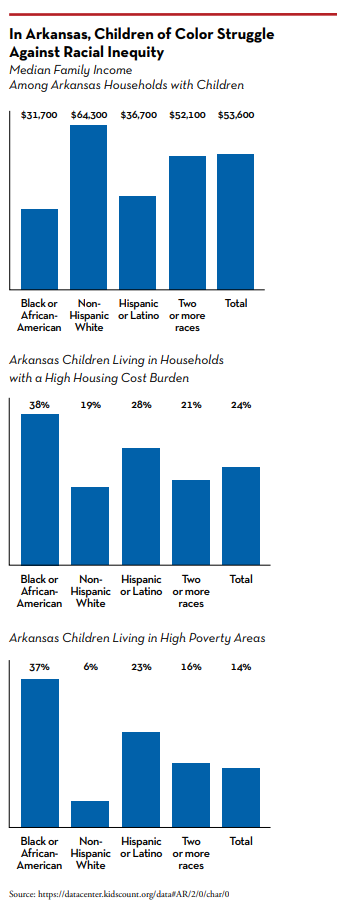Download this handout: Racial Equity and Inclusion
Racial identity should have no influence on how well a child fares in society. But it’s no secret that both historic and structural racism in our laws and policies have had a negative impact on the lives of children and families of color statewide, like zoning laws that have led to the divestment and disenfranchisement of communities of color and inequitable criminal justice laws. However, in recent years, Arkansas has taken steps to dismantle oppressive policies in favor of policies, such as legislation to reform the Arkansas juvenile justice system and the minimum wage increase, that improve the outcomes of our children and families.
Although we have made progress, there remain major gaps along racial and ethnic lines. For example, in Arkansas, 45 percent of our Black children and 33 percent of our Hispanic children live in poverty, compared to 17 percent of our White children. These figures are alarming, as children living in poverty are far more likely to lack stable housing, experience significant educational gaps and suffer worse health outcomes. Children who grow up in poverty are also more likely to have trouble transitioning into stable, productive adults.
Policy options that can help children and families achieve more equitable outcomes include investment in early childhood education (pre-K) and after-school programs, Earned Income Tax Credits, preventive health care and hunger relief programs.
What to Ask Candidates
- What is your definition of racial equity?
- To what extent has pursuing racial equity and inclusion been a priority in your work, and how do you approach it?
- How should Arkansas address the significant disparities in poverty rates of Black and Brown children compared to their White counterparts?
- What do you think are the root causes of these and other disparities along racial and ethnic lines?
Download the handout: Racial Equity and Inclusion


You must be logged in to post a comment.